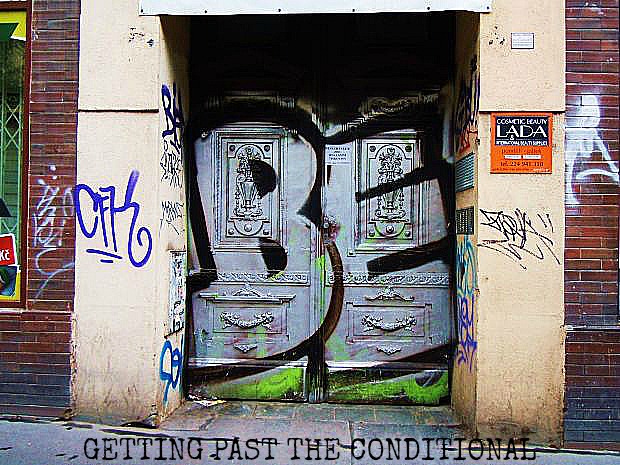Conditions. We’ve all had that at some point.
I would be so much happier if I lost twenty pounds.
I could be happier if my house was completely organized and running like a well-oiled machine.
I can finally relax when my kids are married and having their own children and I don’t have to worry about them as much anymore.
Maybe we even still have them. And while we think conditions themselves are helpful, that they will motivate us to do things differently, they actually are limiting, tend to make us small rather than expand. Because when we talk to ourselves about our conditions, we talk to ourselves in a shaming, nagging, and/or belittling voice. It is not that we shouldn’t try to improve our lives in some way; it is not that we just need to let our aspirations go; the question really is where is this aspiration coming from, what is the truth in it, and, given those things, what are we meant to do with them.
Tired of living in a world of shaming conditions? Today we’re looking at how to shift that mindset.
Identify the voice. Whose behind the voice you hear in your head telling you to be thinner, more organized, a better cook, make more money, and more? Too often the conditions we place on ourselves are not even our conditions. They are someone else’s, and we consciously or unconsciously have bought the message. What are the conditions you live by and what are their origin stories? Before you can get a handle on your conditional living, you really have to know where it came from.
Get clear. Now, that you know the origin story to your conditions (you feel like you need to earn more money because your sister does; you feel like you need to be a more creative mom always leading a family craft activity because your sister-in-law does, etc.), it is time to be really honest with yourself. Does the thing itself matter to you (making more money, creating crafts with your child) or does other people’s perception or your perception of the thing matter? Ask yourself for each condition what it is you really want. Maybe you don’t want to lose time in the morning looking for your keys and that is why you feel like your entire house needs a dramatic organizational overhaul. Maybe you want to be more patient with your child and doing a craft project daily symbolizes the ultimate in patience in you. Maybe making more money makes you think that you will have less to worry about because all of your worries right now feel resolvable with some cash. Get honest and really claim what it is you want.
Identify what is controllable. Now that you know what you really want, it is time to figure out what you want to do about it. You really want to not feel frazzled in the morning and that is why you have been telling yourself for years that you would be so much happier if your entire house was very well organized. But very well organized in your mind means no junk drawer, rainbow spectrum organized closets that hold only clothes that fit you right now and that have coordinating items already identified, a well stocked pantry that leaves you never lacking an ingredient, etc. It would be easy for those standards to feel daunting from the start and so you never get your house into magazine feature shape. Let go of those magazine standards and get specific. What can you do to feel less frazzled in the morning? Deep down inside you know the answer. You just need to ask yourself the question and get quiet enough to hear the answer. It could be as simple as “I want to not run around like a wild woman each morning gathering what I need for the day and manically searching for my keys.” Focus on solutions that will actually make that situation easier rather than the big blanket statement, “I need my whole house to be perfectly organized.” Keys get dropped into the same beautiful bowl each night by the door you exit in the morning. You pack your bag nightly for the next day’s meetings so that is one less thing we have to stress over in the morning. You wake up 15 minutes earlier each day so you can linger over your morning beverage. Often, much smaller solutions can satisfy us but we don’t implement those because they seem so petty compared to our big picture, epic and thus daunting solution.
Every time you find yourself with some epic, absolute thinking, walk yourself through these steps as a starter’s guide in moving yourself from limiting conditions to productive proactivity. It’s not that we shouldn’t aspire to improve our lives, it is that when we believe sweeping generalizations based on messages we have been sold about perfection, we actually keep our lives smaller and less functional that we deserve to be living.



